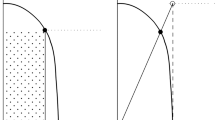Summary
This paper studies the role of impatience in a model with recursively defined preferences. A method is introduced whereby the rate of impatience can be parametrically adjusted for a given aggregator. Using lattice programming and Topkis' Theorem (1978) sufficient conditions are discovered to guarantee that a reduction in the rate of impatience will lead to greater capital stocks in every period.
Similar content being viewed by others
References
Amir, R., Mirman, L., Perkins, W.: One-sector nonclassical optimal growth: optimality conditions and comparative dynamics. Unpublished manuscript (1989)
Beals, R., Koopmans, T.C.: Maximizing stationary utility in a constant technology. SIAM J. Appl. Math.17, 1001–1015 (1969)
Becker, R.A.: Comparative dynamics in the one-sector optimal growth model. J. Econ. Dynam. Control6, 99–107 (1983)
Becker, R.A.: Comparative dynamics in aggregate models of optimal capital accumulation. Quart. J. Econ. 1235–55 (1985)
Boldrin, M., Montrucchio, L.: On the differentiability of the policy function. Unpublished manuscript (1988)
Boyd, J.H. III: Recursive utility and the Ramsey problem. J. Econ. Theory50, 326–345 (1990)
Boyd, J.H. III: Lecture notes on capital theory. University of Rochester, May 1987
Becker, R.A., Majumdar, M., Nishimura, K.: Optimality and decentralization in infinite horizon economies. In: Feiwel, G. (ed.) Joan Robinson and modern economics theory. New York: Macmillan 1989
Benhabib, J., Majumdar, M., Nishimura, K.: Global equilibrium dynamics with stationary recursive preferences. J. Econ. Behav. Organiz.8, 429–452 (1987)
Benhabib, J., Nishimura, K.: Competitive equilibrium cycles. J. Econ. Theory35, 284–306 (1985)
Bewley, T.: Existence of equilibria in economies with infinitely many commodities. J. Econ. Theory27, 514–540 (1972)
Chiang, A.C.: In: Fundamental Methods of Mathematical Economics. New York: McGraw-Hill 1984
Dechert, W.D., Nishimura, K.: A complete characterization of optimal growth paths in an aggregated model with a non-concave production function. J. Econ. Theory31, 332–354 (1983)
Lucas, R., Stokey, N.: Optimal growth with many consumers. J. Econ. Theory32, 139–171 (1984)
Majumdar, M., Nermuth, M.: Dynamic optimization in non-convex models with irreversible investment: monotonicity and turnpike results. Z. Nationalökonomie42, 339–362 (1982)
Mitra, T., Ray, D.: Dynamic optimization on a non-convex feasible set: some general results for non-smooth technologies. Z. Nationalökonomie44, 151–175 (1984)
Santos, M.S.: Smoothness of the policy function in discrete time economic models. Unpublished manuscript (1989)
Topkis, D.M.: Minimizing a submodular function on a lattice. Operat. Res.26, 305–321 (1978)
Author information
Authors and Affiliations
Additional information
I would like to thank my advisor John H. Boyd III for his encouragement at several steps along the way. I would also like to thank P. Dutta, Raghu Sundaram and William Thompson for several helpful suggestions. Finally, I have benefited tremendously from the advice of an anonymous referee. This article reflects the views of the author and does not necessarily reflect the views of the Federal Trade Commission or any individual Commissioner.
Rights and permissions
About this article
Cite this article
Hertzendorf, M.N. Recursive utility and the rate of impatience. Econ Theory 5, 51–65 (1995). https://doi.org/10.1007/BF01213644
Received:
Revised:
Issue Date:
DOI: https://doi.org/10.1007/BF01213644




